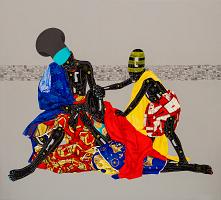PGCert Media & Communications
Content navigation menu
Why study PGCert Media & Communications at Goldsmiths
You are invited to think critically about the larger, global media worlds of the present age, and about your own location in the mediated society in which you live.
- The field of inquiry is organised by bringing together the two dominating perspectives: the sociological or political economy discussion of media institutions, emphasising social power of media organisations; and the domains of subjective identities in mediated societies, drawing from the intellectual traditions of cultural studies. By doing this, we borrow from a range of different academic disciplines: sociology, anthropology, geography, psychology, literature and history.
Gain applicable skills
- This Postgraduate Certificate offers broad knowledge and skills specific of the study of media, but also allows you to engage in critical thought in its widest meanings. These skills are appropriate for future employment in the media industries but also in many other areas.
Empowered and varied learning
- From the outset, we will guide you to work independently and to think through the intellectual issues. Progress is carefully monitored via seminars and varied tutorials (with personal tutors and module leaders). An early diagnostic essay (non-assessed) will help to indicate how you are progressing and identify any areas for support.
- Different kinds of theoretical input and information-retrieval are required for each essay. Through consultation with tutors, you will be guided to the most appropriate intellectual approaches, archives, libraries or electronic sources.
- Trialling ideas takes place in seminars, giving you the opportunity to construct a dialogue amongst yourselves as well as via tutorial support. This provides a chance to learn how to present your ideas succinctly, to discriminate between different traditions of critical thought, and also to listen to other, perhaps competing, lines of argument.
- Optional modules are taught via the familiar mix of lectures, seminars and tutorials, although there are some variations. Some options offer a greater amount of workshop organisation.
- The Department of Media, Communications and Cultural Studies has been ranked second in the UK for 'world-leading or internationally excellent' research (Research Excellence Framework, 2021) and 16th in the world (third in the UK) in the 2024 QS World Rankings for communication and media studies.
Professional development
- The Postgraduate Certificate is primarily aimed at students who want to develop their skills or retrain. The Careers Service provides central support for skills enhancement, running The Gold Award scheme and other co-curricular activities that are accredited via the Higher Education Achievement Report (HEAR).
- The Department has strong industry links and hosts a range of events that bring together industry experts, academics and students.
Contact
If you have specific questions about the degree, contact Lisa Blackman.
Length
Three academic terms (September-June) equivalent to part-time study
Entry requirements
Applicants will normally have, or expect to gain a first degree of at least second class standard (or equivalent).
School
What you'll study
You will study the following compulsory module:
| Module title | Credits |
|---|---|
| Introduction to Media and Communications Theory | 30 credits |
Optional Modules
Your remaining 30 credits will be taken from the Media and Communications department's extensive suite of MA optional modules – either in the form of one x 30 credit option, or two x 15 credit options.
Note about optional modules (if available): The above is indicative of the typical modules offered, but is not intended to be construed or relied on as a definitive list of what might be available in any given year. The module content and availability is subject to change.
How you'll be assessed
Taught sessions and lectures provide overviews of themes, which students are encouraged to complement with intensive reading for presentation and discussion with peers at seminars. Assessments build on lectures and seminars so students are expected to attend all taught sessions to build knowledge and their own understanding of their chosen discipline.
All assessed work is accompanied by some form of feedback to ensure that students’ work is on the right track. It may come in a variety of forms ranging from written comments on a marked essay to oral and written feedback on developing projects and practice as they attend workshops.
Entry requirements
Applicants will normally have or expect to gain a first degree of at least second class standard (or equivalent).
International qualifications
We accept a wide range of international qualifications. Find out more about the qualifications we accept from around the world.
If English isn’t your first language, you will need an IELTS score (or equivalent English language qualification) of 6.5 with a 6.5 in writing and no element lower than 6.0 to study this programme. If you need assistance with your English language, we offer a range of courses that can help prepare you for postgraduate-level study.
How to apply
Apply directly to Goldsmiths using our online application system.
Find out more about applying for a postgraduate qualification at Goldsmiths.
Fees and funding
Annual tuition fees
These are the PG fees for students starting their programme in the 2025/2026 academic year.
- Home - Part-time: £3750
If your fees are not listed here, please check our postgraduate fees guidance or contact the Fees Office, who can also advise you about how to pay your fees.
It’s not currently possible for international students to study part-time under a student visa. If you think you might be eligible to study part-time while being on another visa type, please contact our Admissions Team for more information.
If you are looking to pay your fees please see our guide to making a payment.
Funding opportunities
Explore the Goldsmiths scholarships finder to find out what funding you may be eligible for.
Paying your fees
Find out about paying your tuition fees.
If you are a UK student you may be eligible for a postgraduate loan.
Find out more about postgraduate fees and explore funding opportunities. If you're applying for funding, you may be subject to an application deadline.
Additional costs
In addition to your tuition fees, you'll be responsible for any additional costs associated with your course, such as buying stationery and paying for photocopying. You can find out more about what you need to budget for on our study costs page.
There may also be specific additional costs associated with your programme. This can include things like paying for field trips or specialist materials for your assignments. Please check the programme specification for more information.





